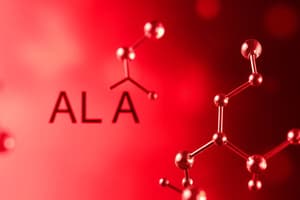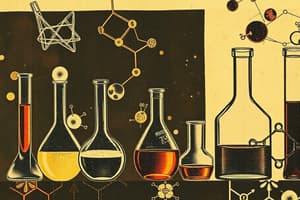Podcast
Questions and Answers
Why are alkanes rather unreactive?
Why are alkanes rather unreactive?
- Due to the presence of only C—C and C—H σ bonds (correct)
- Due to the high reactivity of alkanes
- Because of the presence of C—O bonds
- Because of the presence of C=C double bonds
Which type of bonds contribute to the reactivity of alkanes?
Which type of bonds contribute to the reactivity of alkanes?
- N—H bonds
- C—O bonds
- C—C single bonds
- C=C double bonds (correct)
What feature of alkanes makes them less prone to chemical reactions?
What feature of alkanes makes them less prone to chemical reactions?
- Formation of ionic bonds
- Presence of C=C double bonds
- Presence of C—C and C—H σ bonds (correct)
- High electronegativity
Which type of bonds do alkanes lack that contributes to their unreactivity?
Which type of bonds do alkanes lack that contributes to their unreactivity?
How do alkanes differ from alkenes in terms of reactivity?
How do alkanes differ from alkenes in terms of reactivity?
What type of solvents are alkanes based on the provided information?
What type of solvents are alkanes based on the provided information?
What are the colors of alkanes with more than about 20 carbon atoms?
What are the colors of alkanes with more than about 20 carbon atoms?
How do alkanes generally behave in water?
How do alkanes generally behave in water?
Which process involves alkanes undergoing a Substitution and Elimination reaction?
Which process involves alkanes undergoing a Substitution and Elimination reaction?
What is added to liquid alkanes like petrol and kerosene for safety reasons?
What is added to liquid alkanes like petrol and kerosene for safety reasons?
Which type of alkanes are commonly sold as liquids due to easy condensation under pressure?
Which type of alkanes are commonly sold as liquids due to easy condensation under pressure?
Which state of matter do alkanes from C5 to C16 typically exist in at room temperature?
Which state of matter do alkanes from C5 to C16 typically exist in at room temperature?
What is the relationship between branching in isomeric alkanes and their volatility?
What is the relationship between branching in isomeric alkanes and their volatility?
Which of the following substances do alkanes typically not react with?
Which of the following substances do alkanes typically not react with?
At room temperature, what state are higher alkanes generally in?
At room temperature, what state are higher alkanes generally in?
Which property makes alkanes relatively unreactive compared to other compounds?
Which property makes alkanes relatively unreactive compared to other compounds?
Why are alkanes insoluble in water?
Why are alkanes insoluble in water?
Which statement best describes the relationship between the length of an alkane chain and its melting and boiling points?
Which statement best describes the relationship between the length of an alkane chain and its melting and boiling points?
Why are lower alkanes considered highly volatile?
Why are lower alkanes considered highly volatile?
What type of bonds do alkanes form with water molecules?
What type of bonds do alkanes form with water molecules?
How do alkanes compare to water in terms of polarity?
How do alkanes compare to water in terms of polarity?
Which type of hydrocarbon is an alkane?
Which type of hydrocarbon is an alkane?
What is the simplest alkane?
What is the simplest alkane?
How are alkanes classified based on structure?
How are alkanes classified based on structure?
What is the reason behind atomic orbitals undergoing hybridization?
What is the reason behind atomic orbitals undergoing hybridization?
What type of orbital results from sp3 hybridization?
What type of orbital results from sp3 hybridization?
Which intermolecular force involves London dispersion forces?
Which intermolecular force involves London dispersion forces?
What effect does molecular weight have on the melting and boiling points of alkanes?
What effect does molecular weight have on the melting and boiling points of alkanes?
What is the solubility behavior of alkanes?
What is the solubility behavior of alkanes?
What is the main reason behind the solubility behavior of alkanes?
What is the main reason behind the solubility behavior of alkanes?
How do alkanes compare to other hydrocarbons in terms of saturation?
How do alkanes compare to other hydrocarbons in terms of saturation?
Flashcards are hidden until you start studying
Study Notes
Reactivity of Alkanes
- Alkanes are rather unreactive due to the presence of strong, non-polar C-H and C-C bonds.
- The lack of pi bonds in alkanes contributes to their unreactivity.
Difference from Alkenes
- Alkanes differ from alkenes in terms of reactivity, as alkenes are more reactive due to the presence of pi bonds.
Physical Properties
- Alkanes with more than 20 carbon atoms are typically waxy solids with a white or colorless appearance.
- Alkanes generally do not mix with water (immiscible) and tend to float on top of it.
- Liquid alkanes like petrol and kerosene have a dye added for safety reasons.
- Alkanes from C5 to C16 typically exist as liquids at room temperature.
- Higher alkanes are typically solids at room temperature.
Solubility
- Alkanes are insoluble in water due to their non-polar nature.
- Alkanes do not react with water molecules and do not form hydrogen bonds with them.
Branching and Volatility
- The more branched an isomeric alkane is, the less volatile it tends to be.
Hybridization
- Atomic orbitals undergo hybridization to form a tetrahedral shape, resulting in sp3 hybridization.
- This hybridization leads to the formation of strong, non-polar bonds in alkanes.
Intermolecular Forces
- London dispersion forces are responsible for the weak intermolecular forces between alkane molecules.
- These forces increase in strength as the molecular weight of the alkane increases.
Saturation
- Alkanes are saturated hydrocarbons, meaning they have only single bonds between carbon atoms.
- This saturation makes alkanes relatively unreactive compared to other hydrocarbons.
Classification
- Alkanes are classified based on their structure, with the simplest alkane being methane.
- Alkanes can be classified as straight-chain, branched, or cyclic.
Studying That Suits You
Use AI to generate personalized quizzes and flashcards to suit your learning preferences.




